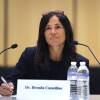Massachusetts' public school funding formula has changed for the first time since 1993, thanks to a new law passed by the state legislature that adds $1.5 billion to schools, and aims for more equity across the state.
How will that money get spent? Former Education Secretary Paul Reville joined Boston Public Radio to break down what happens next.
"This will have particular effect in our poorest communities in the commonwealth," he said. "But just having more money doesn't necessarily mean you're going to do a good job. It's how you spend the money that's going to make all the difference."
The new formula aims to reduce inequities between districts by infusing more money in communities that face larger costs in special education, employee health care, low-income students, and English language learners.
But the specifics are still unknown, and the duty now rests on the shoulders of individual cities and towns.
"We have a decentralized system of education, so a lot of the decisions about how the money gets spent are not mandated at the state level, but are decided at the local level," said Reville. "It will be up to school committees, superintendents and principals to make decisions on wise ways in which to spend this money."
"I'd definitely be all in favor of doing more, for example, in the way of pre-school or in terms of after-school, more summer learning opportunities, more mental health supports for students in schools, but whether or not the money goes in that direction ... remains to be seen."
Reville is Former Secretary of Education and a professor at Harvard University’s Graduate School of Education where he also runs the Education Redesign Lab. His new book co-authored with Elaine Weiss is called "Broader, Bolder, Better: How Schools and Communities Help Students Overcome the Disadvantages of Poverty."







